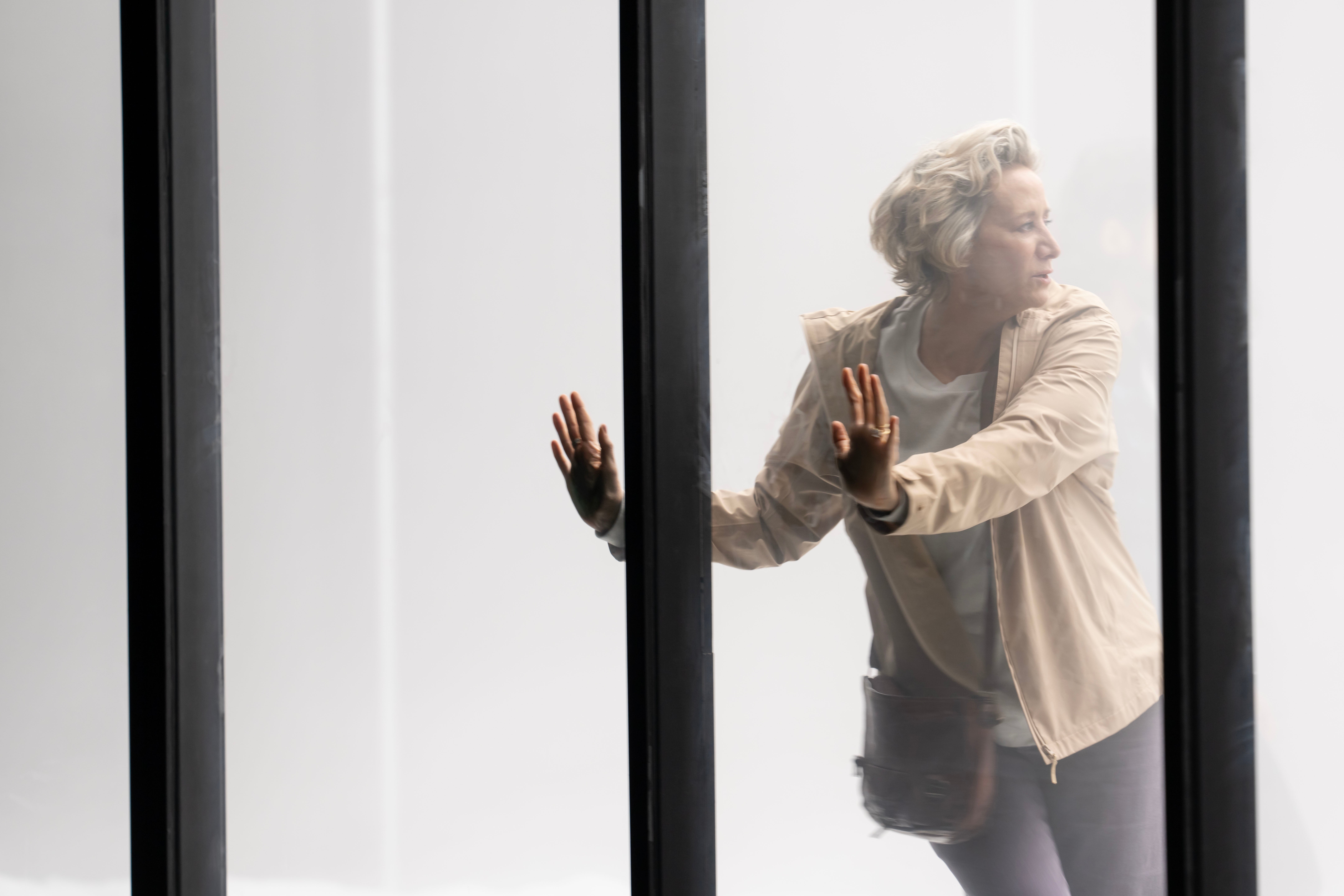Phaedra review: Janet McTeer is riveting in a wry, stylish take on sexual obsession
Six years after ‘Yerma’, director Simon Stone puts another old story into a giant glass box with thrilling and maddening results

Six years after he put Billie Piper in a giant glass box for his smash hit take on Yerma, Simon Stone is back with another uncompromising, thrilling story of a tormented woman, lifted from the classics. This time round it’s formidable actor Janet McTeer who’s behind the glass, taking chunks out of her unfortunate tank-mates with the appetite of a ravening piranha.
Stone takes Ancient Greek drama Phaedra less as his source material, and more as his approximate starting point for a play that skewers middle-class hypocrisy, colonialism, and the supreme, all-destroying selfishness of sexual obsession. Here, McTeer plays Helen, a wealthy middle-aged politician who we first see glowing in a silk shirt and pleasurably illuminated by the desire of the men around her. Her husband Hugo (Paul Chahidi) brings her a hessian bag of food shopping in his teeth, like a soft-eyed labrador with a tennis ball. She kisses her relentlessly nice son-in-law Eric (John MacMillan) full on the mouth. And her ex-lover’s son Sofiane (Assaad Bouab) calls her his “Viking goddess”, his childhood memories of her giving her an almost supernatural sexual power in his eyes.
Stone’s dialogue is sparky, hilarious and lightning-quick, its strands interlocking and tangling together like electric cables. He’s working with weighty themes like lust and fate, but he constantly destabilises them with ironic little touches: “that’s really f***ing deep”, says Phaedra’s nerdy 15-year-old son Declan (Archie Barnes), stifling a discussion on the nature of free will as surely as if he’d sprayed the room with Lynx Africa.
In among the drollness, there’s some serious sexual power here. McTeer is riveting to watch as she hymns her long-lost sexuality in a fertile field of ripe golden corn, visibly gaining strength from her lust for Sofiane. As in Sondheim musicals, this is a show where mature womanhood is presented as much more satisfying than the greener variety.

Still, for all McTeer’s anti-hero glamour, there’s also something uncomfortably remorseless about Stone’s take on Phaedra – he’s far tougher on his heroine than Euripides, Seneca or Racine’s versions were, robbing her eventual fate of its tragedy. Her crime isn’t just allowing passion to destroy her family. It’s also blindly exoticising her lovers’ Moroccan heritage, ignoring their activism and luring them siren-like into mortal danger (while she gets rich espousing “tough on immigration” values). There’s no need to ponder how much Helen’s in the wrong for giving into lust when she’s so demonstrably monstrous in other ways.
What Stone does show beautifully, however, is the way that one selfish person drains the life from the people they lean on. The men Helen hurts form an endearing, shoulder-slapping brotherhood of misfits. Invigoratingly, Helen’s meek Christian friend Omolara (Akiya Henry) eventually finds the strength to call her a c***. It’s not a classic moment of Ancient Greek theatrical catharsis, but it’s one that’s totally in keeping with the spirit of Stone’s wry, stylish and occasionally maddening take on an old, old story.
‘Phaedra’ runs at the National Theatre until 8 April
Join our commenting forum
Join thought-provoking conversations, follow other Independent readers and see their replies
Comments


Bookmark popover
Removed from bookmarks